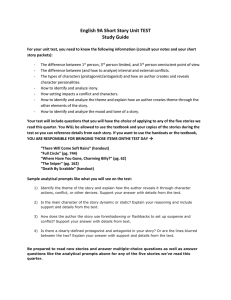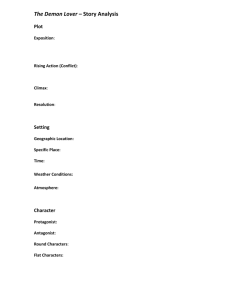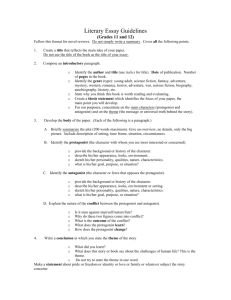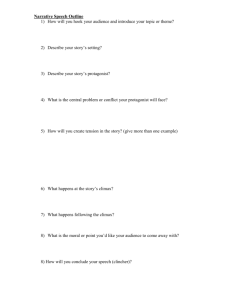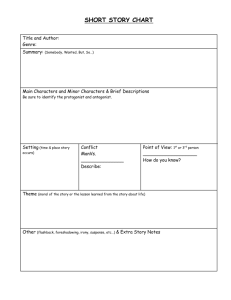The Outsiders - tiffanyhelfer
advertisement
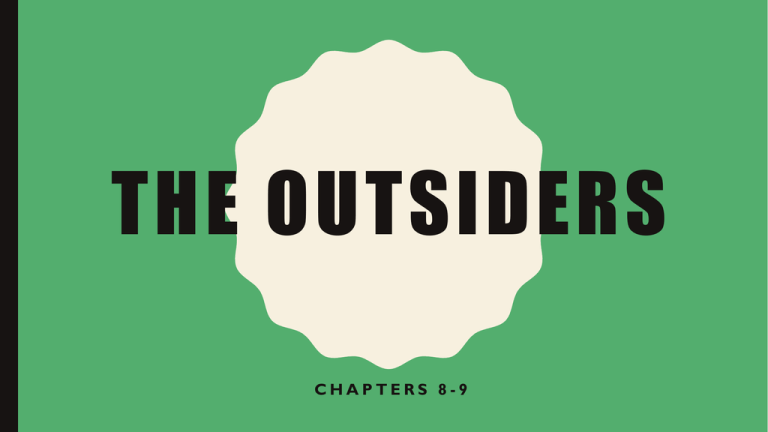
THE OUTSIDERS CHAPTERS 8-9 THE STUDENTS WILL LEARN HOW TO DETERMINE THE DENOTATION AND CONNOTATION OF WORDS USED IN TEXT Now, choose six words that had a special impact on you, and write a sentence or two for each one, explaining why you decided those words have a positive or a negative connotation. Number your answers to match the number of the example you chose. Use the back of this paper or a separate sheet of paper. See the example below. EX To me, distract has a negative connotation, because it means to draw away or divert attention away from something when your attention should be on what you are doing. QUICK WRITE On page 38, Cherry said,” Rat race is a perfect name for it. We’re always going and going and going, and never asking where. Did you ever hear of having more than you wanted? So that you couldn’t want anything else and then started looking for something else to want? It seems like we’re always searching for something to satisfy us, and never finding it.” How come no matter how much we get, we never seem to feel satisfied? How can we get satisfied ? THE STUDENT WILL LEARN HOW TO EVALUATE CHARACTER VIRTUES AND TRAITS AND HOW THIS AFFECT THE OVERALL THEME OF THE STORY. “WANTED” POSTER DIRECTIONS: • LOYALTY: Faithfulness to a person or group; devotion; having a sense of duty to someone. • *Within a “group” • RIVALRY: Competition or action against an opposing group/individual; antagonism; jealousy • *Between two “groups” • There is sometimes a fine distinction between both and how perception plays a role! • The poster should include: Character name Hand drawn visual of character, detailed and in color Accusation: Loyalty or Rivalry in a general statement Physical description Personality traits Specific acts committed (minimum three) Short paragraph containing quote(s) from the novel that support the crime/provides evidence • Known hangouts and nicknames (if any) • Reward • • • • • • • • CHAPTER 8 VOCABULARY • numbly—without the capability of taking action or feeling emotion • faltered—spoke unsteadily; stammered • resemblance—similarity of appearance; likeness • divert—to distract; to turn away from • doggedly—showing persistent effort; inflexibly; stubbornly; tenaciously THE STUDENTS WILL LEARN HOW TO DETERMINE A THEME OR CENTRAL IDEA OF A TEXT AND ANALYZE ITS DEVELOPMENT OVER THE COURSE OF THE TEXT; PROVIDE AN OBJECTIVE SUMMARY OF THE TEXT . • Complete Chapter 8 Summary • Complete Chapter 8 Choice Board • Complete Chapter 8 Comprehension Questions CHAPTER 9 VOCABULARY • mortal—severe; extreme; intense • grimacing—making an ugly or contorted facial expression, indicating pain, disapproval, etc. • affectionately—warmly; lovingly; fondly • superiority—the condition of being superior or better than • menace—a person whose actions or ideas are considered harmful or dangerous • conformity—acting according to social standards or practices; compliance • stifled—suppressed; withheld • leery—suspicious; wary • contempt—scorn; disgrace; dishonor; disapproval • contracted— drew together; shrunk; condensed • agony—intense physical or mental suffering THE STUDENTS WILL LEARN HOW TO DETERMINE A THEME OR CENTRAL IDEA OF A TEXT AND ANALYZE ITS DEVELOPMENT OVER THE COURSE OF THE TEXT; PROVIDE AN OBJECTIVE SUMMARY OF THE TEXT . • Complete Chapter 9 Summary • Complete Chapter 9 Choice Board • Complete Chapter 9 Comprehension Questions • Theme of The Outsiders-in reading notebook – List three quotes with text evidence that shows the overall theme of the book – Include chapter and page number CHARACTER TYPES • As authors develop their characters through the use of characterization, several character types emerge: • The protagonist of a story is the main character that changes throughout the story. • The antagonist is the main character in opposition to the protagonist; the antagonist usually causes the protagonist‘s problems. The antagonist can also be a force of nature. • Round characters are complicated and fully developed. • Flat characters are simple and uninteresting. • Dynamic characters are those that grow or change emotionally or learn a lesson. • Static characters never change or grow in the story.
